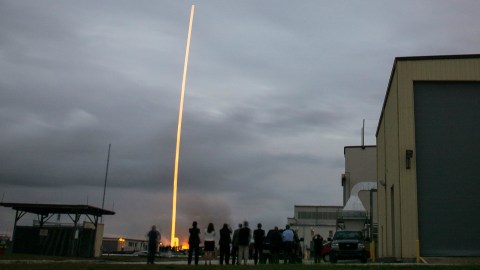The Dawn of Orion: NASA Launches a New Era of Space Exploration

Earlier today, just as the sun peeked through the Cape Canaveral morning glow, a 243-foot rocket carrying NASA’s next great hope launched high into the stratosphere. The disembodied voice counting down to ignition provided these few words as the jet-fueled engines crescendoed:
“And liftoff. At dawn. The dawn of Orion and a new era in American space exploration.”
Four hours later, after a pair of Earth orbits and a 3,600-mile fall, Orion splashed down off the coast of Baja California. The mission was deemed a complete success, per USA Today’s James Dean. One NASA official called it “the most perfect flight you could ever imagine.”
We wrote about Orion yesterday when its initial launch got postponed due to a variety of minor complications. The quick and successful bounceback is a big victory for NASA. The space agency has been developing Orion as the spiritual successor to the Space Shuttle. Current plans call for the craft to shuttle astronauts to the moon and Mars within the next 25 years. A major goal for today’s launch was to prove that Orion’s key technological components are already in place. It appears both NASA and the craft came away today with straight A’s.
Over the past several years we’ve had quite a few experts here on Big Think discuss the importance of space travel and exploration. Just last month we posted a video interview with Bill Nye on the Rosetta comet landing. While the ever-exuberant Science Guy cites the adventure and wonder of space exploration as key incentives to shoot for the stars, his biggest concern is that mankind has a better shot at long-term survival if we develop the capabilities to colonize other parts of the galaxy:
“There is no evidence at all that the ancient dinosaurs had a space program and it cost them.”
In a similar vein, Neil deGrasse Tyson talked at length about the great benefits enjoyed by society that can be attributed to NASA and its employees. A fully funded space agency, says Tyson, will stimulate excitement and growth in the STEM fields and produce the next generation of great American scientists:
"You walk into an 8th grade classroom and the kids, not one of them will ever say to you, 'when I grow up, I want to be an NIH researcher or I want to be an NSF researcher.' They may, one day, be that. But those two agencies, as important is the science that they do, do not have a force. They don’t come along with a force that operates on the ambitions of students. NASA does."
What's your take on Orion? What will it take for you to become excited about a return trip to the moon or a groundbreaking journey to Mars? How do you feel about NASA with regard to the support it gets from Congress? Let us know down below in the comments.
Read more at USA Today
Photo credit: NASA





